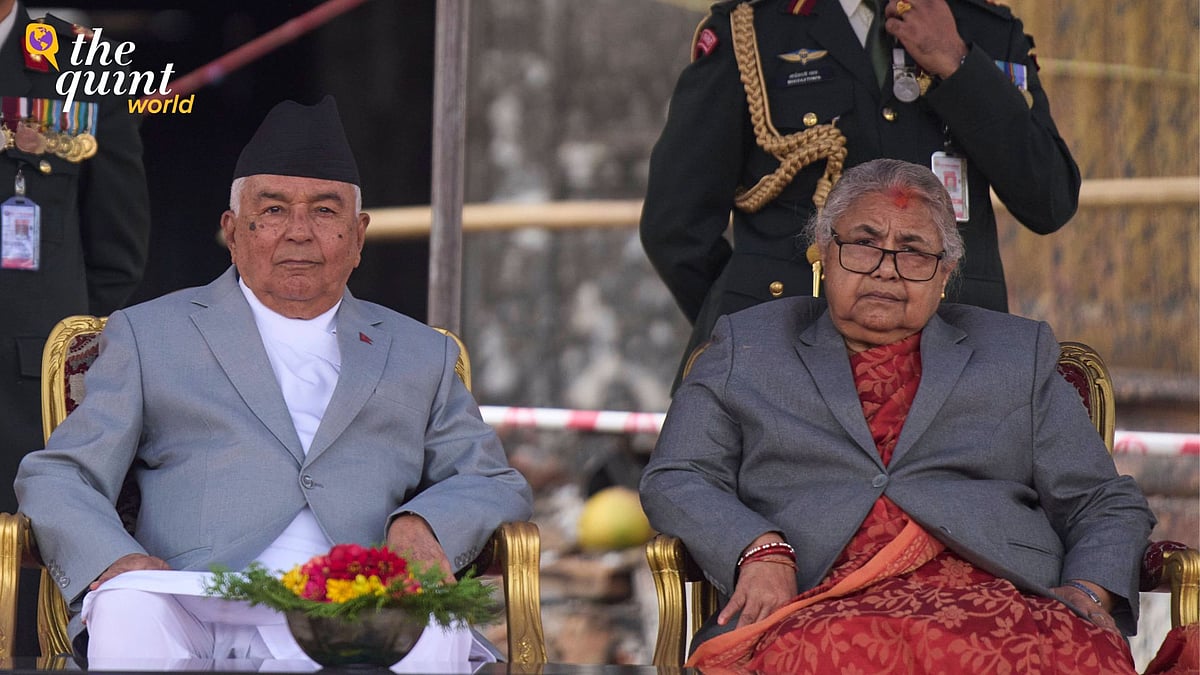Nepal Parliament Dissolved: Battle Lines Drawn Between Gen Z, Political Parties
'Gen Z's concerns are important, but solutions must be found within Constitutional ambit,' a political leader said.

advertisement
"Any step outside the constitutional path is a grave misfortune for the country," says Mahesh Bartaula, Chief Whip of the KP Sharma Oli-led Communist Party of Nepal (Unified Marxist–Leninist) (CPN-UML), echoing concerns raised by a joint letter written by eight political parties in the country which have opposed the dissolution of Nepal's Parliament.
The statement was issued on Saturday, 13 September, hours after President Ram Chandra Poudel dissolved the House of Representatives and announced former Chief Justice of Nepal Sushila Karki as the interim Prime Minister on the night of Friday, 12 September.
However, the decision hasn't gone down well with the former political masters of Nepal—who have called the move "unconstitutional", "arbitrary", and "rushed".
'Answers Lie Within Constitution, Not Impulse'
Saturday's statement calling for the reinstatement of Parliament has been signed by the chief whips of eight major political parties in Nepal, including the CPN-UML, Nepali Congress, and Communist Party of Nepal (Maoist Centre).
"Rejecting the Parliament elected by the sovereign wisdom of the Nepali people and handing over the country to forces that are against the constitution, against the system, and against democracy would be a historic blunder," says Bartaula, one of the letter's signatories, while speaking to The Quint.
Bartaula states that while his party accepts the formation of an interim government to tide over the political turmoil in Nepal, he says that there was no need for the president to dissolve the House as elections were due anyway in the next two years.
Bartaula's party colleague Bishnu Rijal, who is a Central Committee Member of the CPN-UML, agrees with him. He says that while his party supports the proposal to form a high-level judicial commission to impartially investigate the incidents of 8 and 9 September as well as the creation of a separate commission to investigate political corruption, such decisions can only be greenlit by Parliament and not any other institution.
"If this is the case, then why dissolve Parliament? The upcoming election will also elect a new Parliament, so what difference does it make?" he tells The Quint.
What Happened During Negotiations With Gen-Z?
Following the protests that rocked Nepal to a halt, several rounds of negotiations had been held between President Poudel, the then frontrunner for PM Karki, Nepal's Army Chief Ashok Raj Sigdel, Gen-Z representative Sudan Gurung, and a number of constitutional lawyers who had been invited to express their opinions on the way forward.
However, the Gen-Z protesters were firm in their resolve to have Karki become prime minister, and if that necessitated the dissolution of Parliament, then so be it.
"President Poudel had earlier been insisting that the next Prime Minister should be among the MPs. Appointing Sushila Karki to the post would mean dissolving the Parliament—which he does not want to do," the constitutional lawyer had said while speaking to The Quint earlier.
However, at the end the president was forced to side with the Gen-Z protesters and dissolve the Parliament—much to the dismay of Nepal's political parties.
Shyam Ghimire, Chief Whip of the Sher Bahadur Deuba-led Nepali Congress and another signatory of the joint statement, says that a middle path could have been opted for instead which would have satisfied all stakeholders.
"We had the option of making Sushila Karki a member of parliament, after which she could have formed a government. Following that, we could have discussed and agreed on constitutional amendments," he tells The Quint.
Where Do Parties Stand on Midterm Elections?
Meanwhile, President Poudel, on the advice of the new government, announced that midterm elections will be held in the country on 5 March 2026—a year before the former Parliament was set to be dissolved.
"The concerns raised by Gen Z are important and must be addressed. Yet, seeking solutions outside the framework of the constitution risks pushing the country toward instability," he said while speaking to The Quint.
"I have heard Gen-Z representatives calling to impose a ban against old political parties, sideline senior political leaders, and elect a populist figure. It mirrors the Ukraine model, and we sincerely hope Nepal does not move in that direction," Pun adds, referencing the ban imposed by Ukraine's government on 11 political parties in 2022 for allegedly having ties with Russia.
Meanwhile, major political stakeholders have said that if elections are held in March 2026, they will certainly take part in it.
Similarly, the Nepali Congress' Shyam Ghimire says that they will participate in the polls if they are held next year.
"If elections are held, we will not shy away. In a democracy everyone has the right to contest, and it is up to the people to vote and decide."
However, he adds that the process of the elections should be fair and the interim government must not bow down to certain "unjust" demands.
"If attempts are made to ban established parties and leaders, can that be called a democratic process? Will it be accepted by the international community? Will it carry legitimacy?" Ghimire asks.
However, in a surprising turn of events, the Gen-Z protesters and their representative Sudan Gurung—who had backed Karki for the post of PM—are now demanding her resignation over the ministerial picks. The protesters allege that the ministers were picked without consulting the Hami Nepal group, which had led the revolt in the country.
Gurung and his supporters staged a protest in front of the PM's residence late on Sunday, 14 September after the ministers were announced, shouting slogans such as "Don’t play politics over the dead" and "PM should resign".
"The most powerful people in Nepal are the people. No one can stop us. I will pull them down from the place where we have placed them," Gurung was quoted as saying by multiple Nepali media outlets.